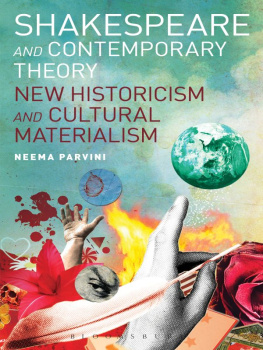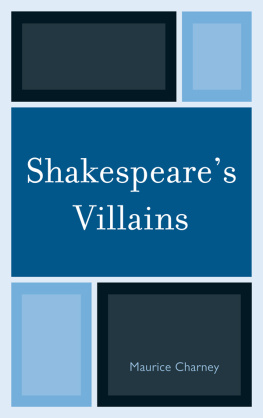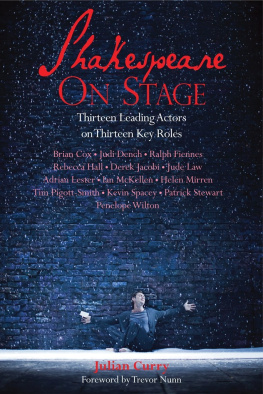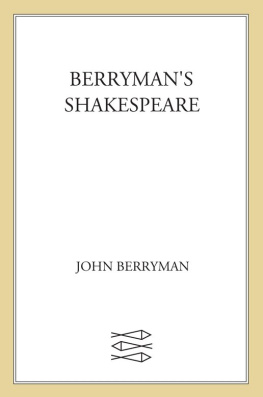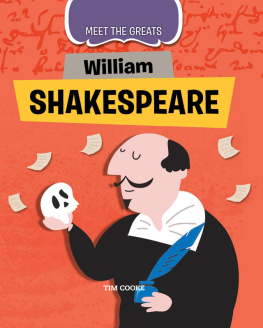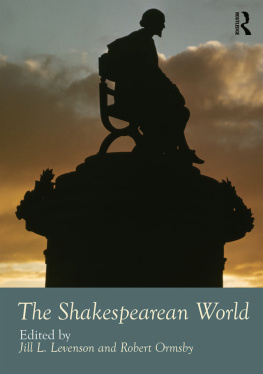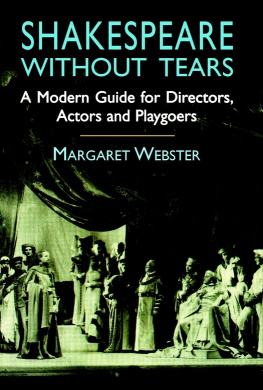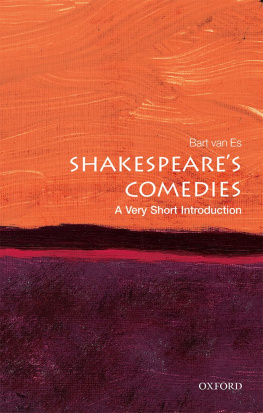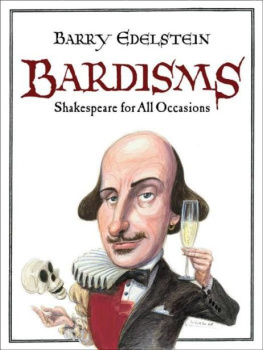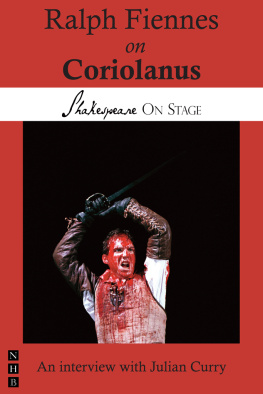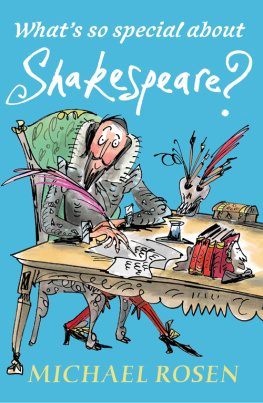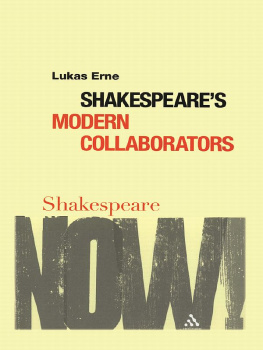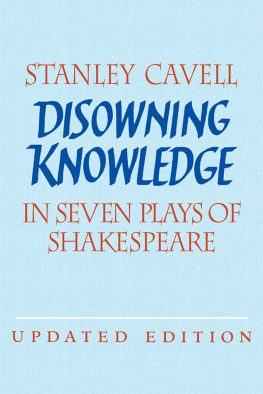
I cannot begin to calculate how many books and articles I have read over the years about Shakespeare. Here are some I recommend highly:
Peter Ackroyd, Shakespeare: The Biography (Chatto & Windus, 2005)
W.H. Auden, Lectures on Shakespeare (Faber & Faber, 2000)
Jonathan Bate, The Genius of Shakespeare (Picador, 1997)
Jonathan Bate, Soul of the Age: The Life, Mind and World of William Shakespeare (Penguin, 2009)
Harold Bloom, Shakespeare: The Invention of the Human (Faber & Faber, 2000)
Graham Bradshaw, Shakespeares Scepticism (Cornell University Press, 1990)
Jonathan Dollimore and Alan Sinfield (eds), Political Shakespeare: Essays in Cultural Materialism (Manchester University Press, 1994)
Declan Donnellan, The Actor and the Target (Nick Hern, 2005)
Marilyn French, Shakespeares Division of Experience (Abacus, 1983)
Stephen Greenblatt, Will in the World: How Shakespeare Became Shakespeare (Jonathan Cape, 2004)
John Gross (ed.), After Shakespeare: An Anthology (Oxford University Press, 2003)
Anthony Holden, William Shakespeare: His Life and Work (Abacus, 2000)
Frank Kermode, Shakespeares Language (Penguin, 2001)
Frank Kermode, The Age of Shakespeare (Weidenfeld & Nicolson, 2004)
Laurence Kitchin, Mid-Century Drama (Faber & Faber, 1960)
Jan Kott, Shakespeare Our Contemporary (Methuen, 1964)
George Henry Lewes, On Actors and the Art of Acting (Grove Press, 2004)
A.D. Nuttall, Shakespeare the Thinker (Yale University Press, 2007)
Garry OConnor, William Shakespeare: A Life (Sceptre, 1992)
Fintan OToole, Shakespeare Is Hard, But So Is Life: A Radical Guide to Shakespearean Tragedy (Granta Books, 2002)
James Shapiro, 1599: A Year in the Life of William Shakespeare (Faber & Faber, 2005)
Ren Weis, Shakespeare Revealed: A Biography (John Murray, 2008)
Ian Wilson, Shakespeare: The Evidence (St Martins Griffin, 1999)
Michael Wood, In Search of Shakespeare (BBC Books, 2003)
First published in 2011
Copyright John Bell 2011
All rights reserved. No part of this book may be reproduced or transmitted in any form or by any means, electronic or mechanical, including photocopying, recording or by any information storage and retrieval system, without prior permission in writing from the publisher. The Australian Copyright Act 1968 (the Act) allows a maximum of one chapter or 10 per cent of this book, whichever is the greater, to be photocopied by any educational institution for its educational purposes provided that the educational institution (or body that administers it) has given a remuneration notice to Copyright Agency Limited (CAL) under the Act.
Every effort has been made to contact the copyright holders of material reproduced in this book. In cases where these efforts were unsuccessful, the copyright holders are asked to contact the publisher directly.
Allen & Unwin Sydney, Melbourne, Auckland, London
83 Alexander Street Crows Nest NSW 2065 Australia Phone: (61 2) 8425 0100 Fax: (61 2) 9906 2218 Email: info@allenandunwin.com Web: www.allenandunwin.com
Cataloguing-in-Publication details are available from the National Library of Australia www.trove.nla.gov.au
ISBN 978 1 74237 193 1
Internal design by Lisa White Index by Geraldine Suter Set in 11/16.5 pt Minion Pro by Bookhouse, Sydney Printed and bound in Australia by Griffin Press
10 9 8 7 6 5 4 3 2 1
ebook production by Midland Typesetters Australia
I dedicate this book to lovers of Shakespeare everywhere, and I am most grateful for the expert guidance of my wife Anna, and my editors Catherine Milne and Ali Lavau.

When my publisher suggested I might write something to mark the twentieth anniversary of the Bell Shakespeare Company, I nearly ran a mile.
The last thing the world needed was another book on Shakespeare, I thought. They come at the rate of three a week and so many of them are brilliant! Whether its the erudition of Stephen Greenblatt and Frank Kermode or the more populist approach of Peter Ackroyd and Bill Bryson, theyre all wonderfulwhat more was there to be said on the subject?
But then I thought of all the knowledge Ive picked up over the last fifty years as an actor/director, and the ten years before that as a university and high-school student, the theories and ideas Ive read, researched, heard about or been taught by various professors, directors and commentators. And I thought about those many theatregoers who enjoy seeing Shakespeare but have a lot of questions: Did he really write all those plays? How do you remember your lines? Why do you do Shakespeare in modern dress? Is he still relevant? How do you prepare a role? Whats it like doing a long run? Should we translate the plays into modern English? Was he a Catholic? Did he believe in ghosts? Was he a feminist? A subversive? On it goes...
So this is a response to those sorts of questions based on my personal experience and reflectionsthe thoughts and reminiscences of a theatrical insider, and an Australian one at that. I have limited my comments to productions I have been involved with or that were especially significant to me. If I were to comment on every Shakespeare performance I have seen, even in the last ten years, that would mean at least one more hefty volume. Some of my musings are, necessarily, conjecture. For instance, I dare to undertake some fictitious interviews with various acquaintances of Shakespeare. This is simply to put my research into dialogue form rather than attempt a scholarly essay. But the facts are as close to the truth as I can ascertain. The one person I could not interview was Shakespearebecause I couldnt hear his voice. The man had a thousand voices, but which one comes closest to his own? Do any of them? How can we ever know?
The more I write of this book, the more aware I become of how much Im leaving out; the subject of Shakespeare is simply inexhaustible. So this is a book I shall never finish. Ill just stop.
Its not a book for academics or theatre buffs. But I hope it may encourage students and other interested readers to delve further into the complexities of Shakespeare in books weightier and worthier than this.
In the twenty-first century, Shakespeare at his best is still the most fun we can have in a theatre.
Michael Wood, In Search of Shakespeare
I am sitting in a cramped backstage space in Brisbanes intimate Cremorne Theatre during a preview of Anatomy Titus Fall of Rome: A Shakespeare Commentary , by Heiner Mller. Im having trouble writing because my right hand is swathed in bandages, having been cut off by Aaron the Moor.
On stage a battle rages as members of the all-male cast fling blood-soaked copies of Penguin Shakespeare at each other to the strains of a corny MGM fanfare from Demetrius and the Gladiators . Shortly I shall enter as mad Titus, wearing a chefs hat and apron, banging a dinner gong and ladling helpings of blood from a big bucket into the cupped hands of my dinner guests in an obscene parody of Holy Communion. Where are my sons? asks the empress Tamora, to which I reply, Youve just eaten them, you niggers whore... How tastes your scum?
Next page


